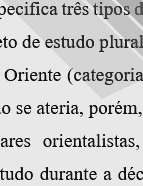

This revisiting of sources, which can be seen to take place from the second half of the nineteenth century onwards, was undertaken not only by philologists, but also by historians. Although these efforts served as an ideological exercise in recovering Portugal’s faded glory, they also worked as an exercise that reflected upon the cause of a failed imperial project. Catalogues of manuscripts available in the kingdom’s various public libraries were published (see, for example, Cunha Rivara’s Catalogo, 1850-1871), a kind of archival work which would come back into fashion between the 1940s and 70s. Unedited or forgotten documentary sources were recovered, and reprinted, edited or translated, as in the case of the Count of Ficalho’s 1892 edition of Garcia da Orta’s two-volume Colóquios dos Simples e Drogas da Índia [Conversations on the Simples, Drugs and Medicinal Substances of India]. Scholars also studied episodes where Portugal’s national history crossed over with that of the East and the great figures involved in this history of interactions – from those who wrote about it (chroniclers), poeticized it (Camões, Fernão Mendes Pinto) or alluded to it on stage (Gil Vicente), to those who played an active role in it (the heroes of the kingdom’s maritime expansion, such as the Portuguese navigators and their royal patrons). This exercise in both preserving and redressing historical memory, whether written (as in the case of documentary sources) or material (a project carried out through collections and exhibitions, and also numismatic and epigraphical studies) constituted a redefinition of the national identity, as well as the simultaneous revindication of Portugal’s rightful place within orientalism.
Many of the publications that make up Portugal’s orientalist discursive production were printed as part of commemorative events which moulded the fin-de-siècle national mythology through the glorification of historical heroes. Such events included the tricentenary of the death of Camões (1880), the famous narrator of Portugal’s exploits in the Orient, the fourth centenary of the discovery of the sea route to India (1898) and the fifth centenary of the conquest of Ceuta by Afonso de Albuquerque (1915). Beneath this act of reviving and naming these figures from Portugal’s historical past, there lies not only an attempt to humanize this past, but also a dichotomy that runs through all Portuguese discourse about the East, that of the country’s pioneering actions in gaining knowledge about the geographical space, and in establishing commercial, linguistic and cultural contacts within it – actions which appear to be incompatible with the lag in studies about this same Orient in Portugal and the nation’s lacking visibility in European scientific circles in the nineteenth and twentieth centuries.
The critical apparatus applied to sources that were revisited or edited for the first time frequently served as a rhetorical space for the discussion of the non-Christian, non-European Other, and also for the rewriting of history. See, for example, the case of Esteves Pereira, in whose work one can detect a historiography which, based on the principles of classical philology, defends the historical truth of the written word, which is to say, of sources.
